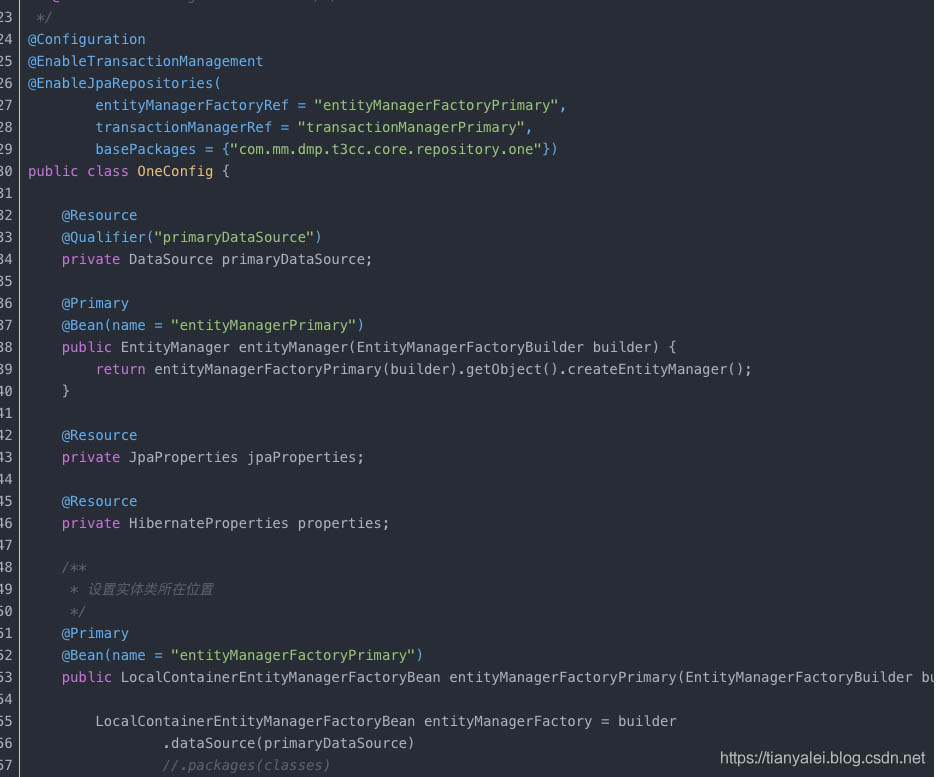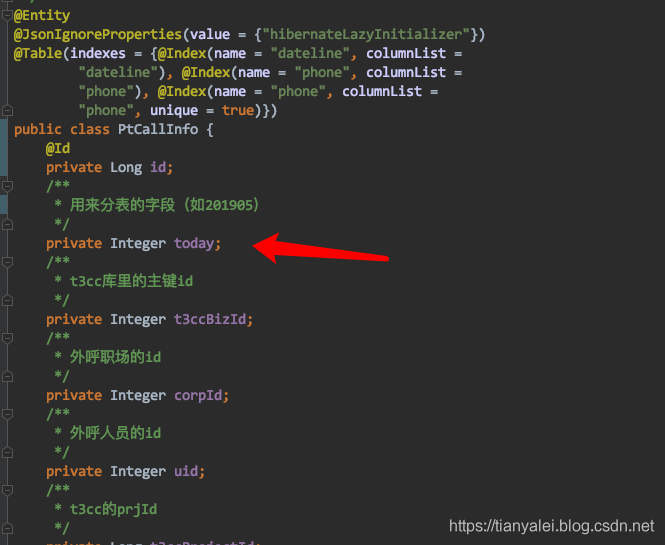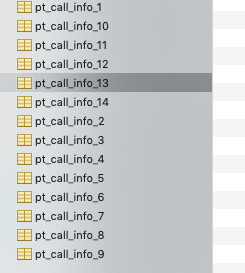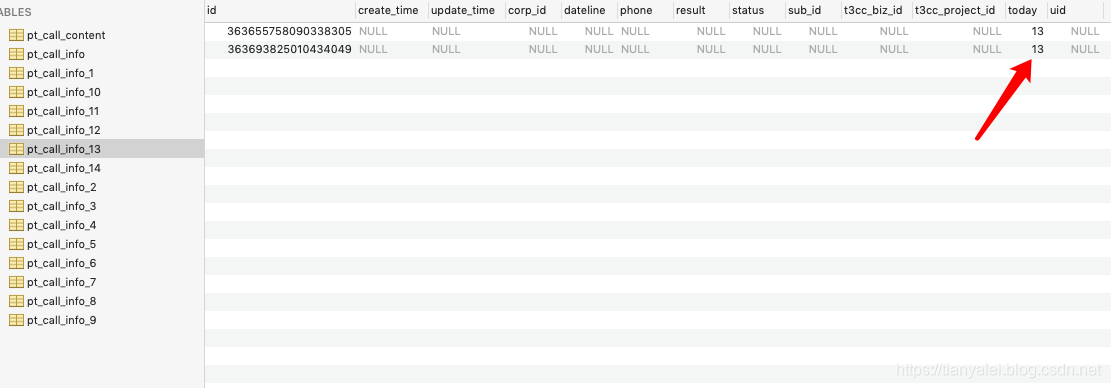SpringBoot 如何使用sharding jdbc进行分库分表
基于4.0版本,Springboot2.1
之前写过一篇使用sharding-jdbc进行分库分表的文章,不过当时的版本还比较早,现在已经不能用了。这一篇是基于最新版来写的。
新版已经变成了shardingsphere了,https://shardingsphere.apache.org/。
有点不同的是,这一篇,我们是采用多数据源,仅对一个数据源进行分表。也就是说在网上那些jpa多数据源的配置,用sharding jdbc一样能完成。
也就是说我们有两个库,一个库是正常使用,另一个库其中的一个表进行分表。
老套路,我们还是使用Springboot进行集成,
在pom里确保有如下引用
<sharding-sphere.version>4.0.0-RC1</sharding-sphere.version><!-- 分库分表-->
<dependency>
<groupId>org.apache.shardingsphere</groupId>
<artifactId>sharding-jdbc-spring-boot-starter</artifactId>
<version>${sharding-sphere.version}</version>
</dependency>
<dependency>
<groupId>org.apache.shardingsphere</groupId>
<artifactId>sharding-core-common</artifactId>
<version>${sharding-sphere.version}</version>
</dependency>
<!-- 分库分表 end-->
<dependency>
<groupId>org.springframework.boot</groupId>
<artifactId>spring-boot-starter-data-jpa</artifactId>
</dependency>spring:
application:
name: t3cc
profiles:
active: sharding-databases-tables
# datasource:
# primary:
# jdbc-url: jdbc:mysql://${MYSQL_HOST:localhost}:${MYSQL_PORT:3306}/${DB_NAME:dmp_t3cc}?useUnicode=true&characterEncoding=UTF8&serverTimezone=Hongkong
# username: ${MYSQL_USER:root}
# password: ${MYSQL_PASS:root}
# secondary:
# jdbc-url: jdbc:mysql://xxxxxxxxxxxxx/xxxxxx?useUnicode=true&characterEncoding=UTF8&serverTimezone=Hongkong
# username: xxxxx
# password: xxxxxxx
jpa:
database: mysql
database-platform: org.hibernate.dialect.MySQL5InnoDBDialect #不加这句则默认为myisam引擎
hibernate:
ddl-auto: none
naming:
physical-strategy: org.springframework.boot.orm.jpa.hibernate.SpringPhysicalNamingStrategy
open-in-view: true
properties:
enable_lazy_load_no_trans: true
show-sql: trueyml里还是老套路,大家注意,我把之前的多数据源的配置给注释掉了,改成使用sharding来完成多数据源。
里面我profiles.active了另一个
sharding-databases-tables.yml
db:
one: primary
two: secondary
spring:
shardingsphere:
datasource:
names: ${db.one},${db.two}
primary:
type: com.zaxxer.hikari.HikariDataSource
jdbc-url: jdbc:mysql://${MYSQL_HOST:localhost}:${MYSQL_PORT:3306}/${DB_NAME:dmp_t3cc}?useUnicode=true&characterEncoding=UTF8&serverTimezone=Hongkong
username: ${MYSQL_USER:root}
password: ${MYSQL_USER:root}
max-active: 16
secondary:
type: com.zaxxer.hikari.HikariDataSource
jdbc-url: jdbc:mysql://xxxxxxx:3306/t3cc?useUnicode=true&characterEncoding=UTF8&serverTimezone=Hongkong
username: xxx
password: xxxxxx
max-active: 16
sharding:
tables:
pt_call_info:
actual-data-nodes: ${db.one}.pt_call_info_$->{1..14}
table-strategy:
inline:
sharding-column: today
algorithm-expression: pt_call_info_$->{today}
key-generator:
column: id
type: SNOWFLAKE
pre_cc_project:
actual-data-nodes: ${db.two}.pre_cc_project
pre_cc_biztrack:
actual-data-nodes: ${db.two}.pre_cc_biztrack可以看到datasource里,定义了2个数据源,names=primary,secondary,这个名字随便起。之后分别对每个数据源配置了type、url等基本信息。
在sharding里,我针对要被分表的pt_call_info表做了配置,分为14个表pt_call_info_1到pt_call_info_14,分表的原则是根据today这个字段,today为1就分到pt_call_info_1这个表。这也是我这个数据源,唯一要做配置的表。
另外,secondary这个数据源里,也有两个表,但我不想分表,只是当成普通的数据源进行操作。所以,我只是单独列出来他们的表名,并指定actual-data-nodes为第二个数据源的表名。这里是必须要列出来所有表的,无论是否需要分表,不然对表操作时,会报错找不到表。所以需要手工指定。
配完这个yml就ok了,别的什么都不用配了。也不需要像之前的多数据源时,像如下的配置都不用了。不需要指定model和repository的包位置什么的。

当yml配置好后,就可以把两个数据源的model和Repository放在任意的包下,不影响。
无论是对哪个表进行分表,都还是正常定义这个entity就行了。譬如下面就是我用来分表的model,就是个普通的entity。

之后手工把表都建好
然后就可以像平时一样操作这个model类了。

@RunWith(SpringRunner.class)
@SpringBootTest
public class T3ccApplicationTests {
@Resource
private ProjectManager projectManager;
@Resource
private PtCallInfoManager ptCallInfoManager;
@Test
public void contextLoads() {
List<PreCcProject> preCcProjectList = projectManager.findAll();
System.out.println(preCcProjectList.size());
for (int i = 1; i <= 14; i++) {
PtCallInfo ptCallInfo = new PtCallInfo();
ptCallInfo.setId((Long) new SnowflakeShardingKeyGenerator().generateKey());
ptCallInfo.setToday(i);
ptCallInfoManager.add(ptCallInfo);
}
}
}写个测试代码
分别从第二个数据源取值,从第一个数据源插入值,查看分表情况。
注意,id是使用特定的算法生成的,避免分表后的主键冲突。

运行后,可以看到分表成功。
需要注意一个坑
不要使用jpa的saveAll功能,在sharding-jdbc中,用单条去添加,如果你用了saveAll,则会失败,插入错误的数据。
以上为个人经验,希望能给大家一个参考,也希望大家多多支持编程学习网。
